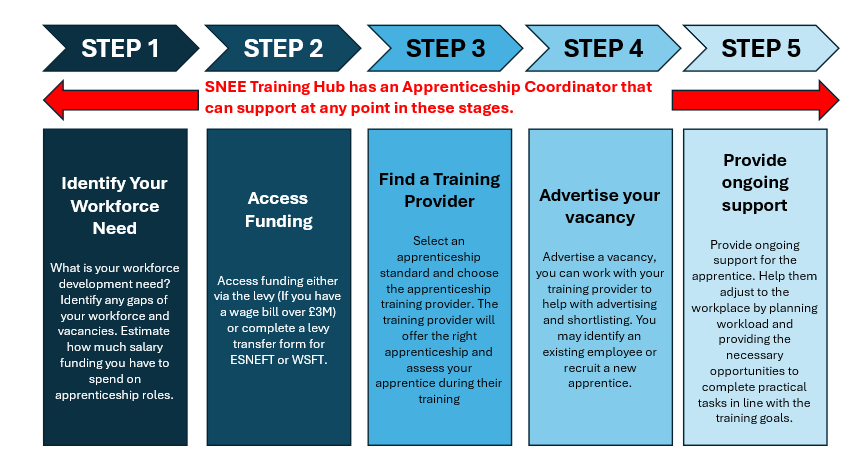Are you looking to expand your workforce OR are you keen to develop and retain your existing staff?
Apprenticeships may be a valuable and viable option for your Practice or PCN to unlock the potential in your staff and recruit new people with a passion for working within the healthcare sector.
If you’re seeking a productive and efficient way to nurture talent and build a motivated, skilled, and qualified workforce, apprenticeships could be the ideal solution. Not only do they help you diversify your team, but they also provide existing employees with the chance to enhance their skills — benefiting both their current roles and future career ambitions.
According to the Education and Skills Funding Agency (ESFA), 86% of employers reported that apprenticeships developed skills relevant to their organization, while 78% noted an improvement in productivity.
What is an Apprenticeship?
An apprenticeship is a work-based training program that leads to a nationally recognised qualification and is available to both new and existing employees. Anyone over the age of 16 who is not in full-time education can apply, with no upper age limit—making apprenticeships beneficial at any stage of a career.
There are various apprenticeship levels, from intermediate and advanced to higher and degree apprenticeships. This allows employers to select the most suitable option based on the job role and the individual’s experience, creating a structured progression pathway. Apprenticeships help develop the skills and knowledge of both new and current staff by combining hands-on training in the workplace with off-the-job learning provided by a training organisation.
Apprenticeships in Primary Care
Apprenticeships offer a valuable opportunity to develop both new and existing employees in a variety of roles, including clinical and non-clinical positions. They help build skills in areas like administration, customer service, leadership and specialised office functions, including Finance, HR and IT.
Available apprenticeship pathways include:
- Business Administration L3
- Healthcare Support Worker L2 & L3
- Team Leadership L3
- Management/Leadership L5 & L7 (currently)
- Finance L2 & L3
- Trainee Nursing Associate L5
- Registered Degree Nurse L6
- Advanced Clinical Practice L7
And many more!
Digital Apprenticeship Service (DAS)
All employers will also need to register for a Digital Apprenticeship service account (DAS).
The below video shows you how:
A written guide can also be found here
What is the Salary of an Apprentice?
Aged 16 to 18
The current National Minimum Wage rate for an apprentice is £7.55 per hour.
Find extra Info here – Recruiting under 18s into the NHS | NHS Employers
Aged 19 or over and in their first year
The current National Minimum Wage rate for an apprentice is £7.55 per hour.
Aged 19 or over and have completed their first year
Apprentices will be entitled to the National Minimum Wage or National Living Wage rate for their age. Whilst the above are the Minimum rates of Pay, there is good evidence to support paying Apprentices above the minimum rate, to ensure the roles are attractive and competitive, meaning you attract more applicants and retain them in Healthcare.
You can also take advantage of not having to pay Employer National Insurance contributions for any Apprentice under 25 – Further details here
Funding
When hiring an apprentice, one of the key considerations is funding – not just their salary, but also educational costs and associated overheads. However, various funding options are available to support apprentices.
Many GP practices/PCN’s may qualify for a Levy Transfer, which can cover up to 100% of course fees. Additionally, national funding programs, such as ARRS, may provide financial support for salary costs during training e.g. Student Nurse Associates, (previously known as Trainee Nursing Associates) or after qualification when they take on a role within the PCN.
How to access funding if you aren’t a levy paying employer
What is a Levy? Not sure if you are a Levy Paying employer? Find out more here
Apprenticeships can be funded via levy transfers; this is when a levy paying employer agrees to fund 100% of the course fees for an apprentice who is employed by a different organisation (either Local or National.)
Please contact the Training Hub for info on levy transfers in your areas.
Are there mentor/supervision requirements?
Apprentices may require some extra support, but with careful planning from the start, you can minimise the impact on team resources. While providing short-term assistance, you’ll be investing in long-term benefits – fostering a sense of value and commitment among staff.
Additionally, mentoring or supervising apprentices presents a great development opportunity for existing employees. The time spent supporting apprentices in the early stages will pay off, helping them adapt and contribute more quickly.
Off The Job Training
As part of an apprenticeship, employees must participate in “Off-the-Job” (OTJ) training, which involves learning outside their regular work activities.
Since August 1, 2022, apprentices working a minimum of 30 hours per week are required to complete at least 6 hours of OTJ training per week. This training must contribute to the achievement of their apprenticeship and take place outside their normal job duties, even if conducted at their usual workplace.
Examples of OTJ training include:
- Completing written assignments or research
- One-on-one mentoring sessions
- Attending classroom or online lessons
- Shadowing a colleague
- Participating in team training
- Independent research
- Coaching sessions
OTJ training doesn’t have to mean lost time for the practice – when planned creatively, it can add value for both the apprentice and the organisation.
Steps to get started…

Functional Skills
In February, the Department for Education announced changes to Functional Skills requirements for apprentices aged 19 or over.
From 11th February 2025 onwards the changes to Functional Skills requirements in apprenticeships are as follows:
- Apprentices aged 16-18 will continue to be subject to the mandatory requirement to study towards and achieve English and maths.
- Apprentices who began their apprenticeship training when aged 19+ will no longer be subject to the mandatory requirement to study towards and achieve English and maths. However, for apprentices aged 19+, the apprentice or their employer can still choose for the apprentice to study towards an English and maths qualification.
You can access further details of these changes in the Apprenticeship Funding Rules.
All employers and education providers should still aspire to provide access to high quality English and maths training. This is so that the literacy and numeracy skills for each post are achieved and for the purposes of the apprentice’s future development.
NHS England Functional Skills Guidance: Skills for Life
For more information or clarity on Functional skills please do not hesitate to message the Training hub.
Career Pathways
Some examples of career pathways in Primary Care:
Additional Information
Training Providers in the area:
- West Suffolk College Apprenticeships
- Colchester institute Apprenticeships | Apprenticeship Training – Colchester Institute
- Suffolk New College Apprenticeships – Suffolk New College
- University of Suffolk Degree Apprenticeships | University of Suffolk
- University of Essex Apprenticeships | University of Essex
- Anglian Ruskin University Course search – ARU
Useful Resources:

